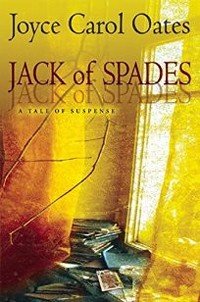
This rather short (200-page) psychological thriller is told as a first-person narrative by successful mystery author Andrew J Rush. Rush thinks of himself with quote marks around his name, perhaps because he’s beginning to realise identity is more ephemeral than he’s heretofore believed. We soon learn he’s begun secretly writing a new series of books under the pseudonym “Jack of Spades”. These books are an exceptionally dark, crude, and surprisingly popular departure from AJR’s usual output. Worse, writing books under his own name is laborious, whereas Jack of Spades books fly onto the page from the tip of his pen.
AJR is one of those intriguing characters – the unreliable narrator. He is self-obsessed, but not self-aware. You’ll realise immediately that, given a choice between behavior that makes sense and behavior that will get him into trouble, he will choose trouble every time. When a woman from the local community launches a baseless plagiarism suit against him, he has two choices: a) call his publisher’s legal department; or b) telephone the woman and try to reason with her. You or I would lawyer up. AJR, of course, chooses b), which leads to a frightful scene.
It turns out the woman plaintiff is slightly unhinged, with a history of suing prominent authors for stealing her outlines and ideas – she’s even sued Stephen King, his lawyer tells him – and the court readily dismisses her complaint. But AJR can’t let it go; he becomes obsessed with her. Added to this is the increasingly insistent voice of Jack of Spades who, like a malevolent Jiminy Cricket, goads AJR toward further steps in all the wrong directions and convinces him she has put a curse on him.
None of AJR’s problems are helped by increasing alcohol intake, and, over the course of about five months, his life unravels and he teeters ever-closer to madness. His marriage founders, he stops writing as Andrew J Rush, his sons confront him about his alcohol abuse, his actions become increasingly inexplicable and, too late, he attempts to atone for his past actions. However, for someone who presumably possesses the creative mind of a novelist, he chooses a rather predictable path in the end.
Early in the book, which is set in New Jersey, the dogged plaintiff reminded me of the fangirl-turned-vicious in Stephen King’s Misery. Although Oates takes her novel in a different direction, the King thriller must have been in her mind, too, because she includes a reference to it. AJR’s attorney tells him, “It’s exactly what stalkers want – forcing a confrontation with the rich and famous,” which merely feeds his client’s paranoia: “I was trying to feel a small dim stir of pride at being called, however extravagantly, rich and famous; I was trying not to feel panic at hearing stalker.” Strangely energised by his fears, it is AJR who repeatedly courts a confrontation with his litigious nemesis and his other chimeric enemies, escalations conveyed vividly in Oates’s tension-filled writing.
This being a novel whose narrator is an author, it includes some early passages disguised as notes on craft that are actually deft foreshadowing. AJR is discussing the structure of the book he is currently working on- the one he will never finish – and describes how his plan is to include a contrasting hero and villain in alternating chapters, with the hero prevailing in the end. AJR and the asides from the Jack of Spades play those contrapuntal roles, as well. AJR says his planned final punishment of the villain is part of the implicit contract between mystery authors and their readers, which simplifies the world’s chaos, “…to allow for an ending that is both plausible and unexpected.” If there’s a flaw in Oates’s book, it is that the ending falls short of that goal.
By making the narrator a somewhat high-brow mystery writer, Oates can quite naturally adopt a voice for the book that reveals a great deal about AJR in its pretensions and in the deprecating tone he uses toward his wife and certainly toward the townspeople. As a reader, you probably won’t like AJR, but it’s delicious to see such a jerk getting himself into deeper and deeper trouble. It’s too bad he takes others with him.
We’ve previously reviewed Evil Eye by Joyce Carol Oates, and she appeared in the anthology released to promote the computer game LA Noire.
Grove Press
Print/Kindle/iBook
£7.99
CFL Rating: 3 Stars









